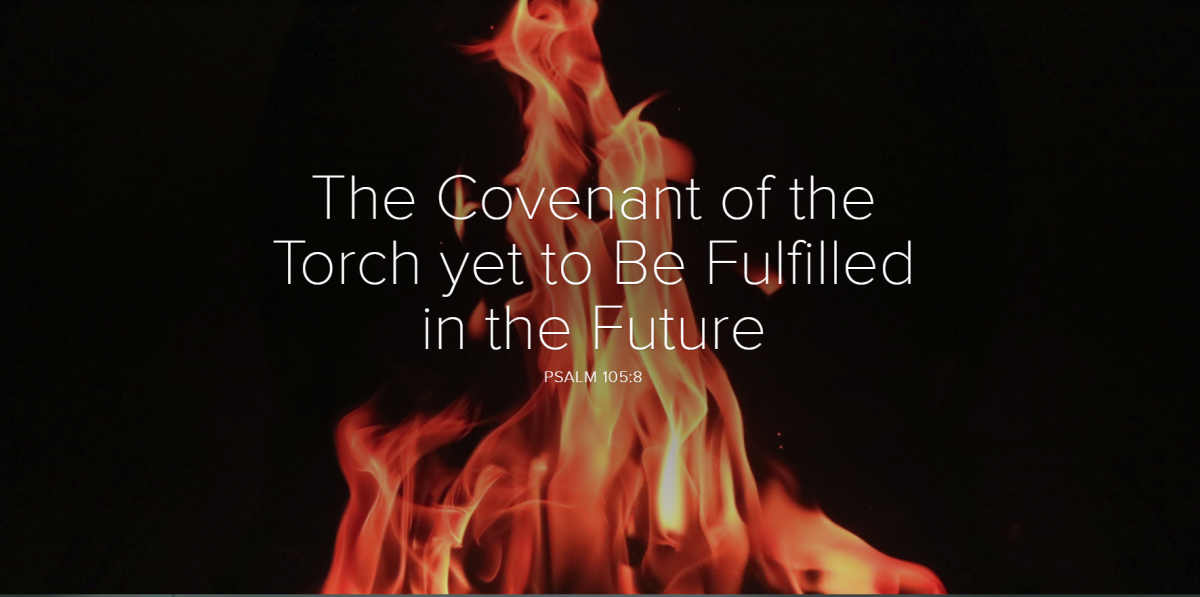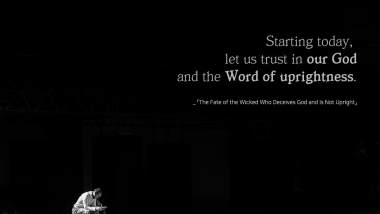
By Rev. Huisun Abraham Park
The Covenant yet to Be Fulfilled
We have studied the process in which the covenant of the torch was fulfilled from the perspective of God's administration in the history of redemption. Although the covenant was fulfilled when the Israelites entered the land of Canaan and the bones of Joseph were buried in Shechem of Canaan in the fourth generation from Abraham, it is a covenant that needs to be fulfilled today in all believers of God who are striving toward the spiritual Canaan, the kingdom of heaven. Thus, the covenant is still valid to us and yet to be fulfilled to its completion in each of us. How can we say that the covenant of the torch is yet to be fulfilled?
The Eternal Attribute of the Covenant of the Torch
The covenant of the torch is yet to be fulfilled because of the eternal attributes of the covenant of the torch. Psalm 105:8–45 is a historical poetry that reflects upon the history of the birth and growth of the chosen people of Israel as a nation. The passage addresses the events from the time the covenant was established with Abraham until it is fulfilled in the book of Joshua. Here, it closely describes the covenant of the torch in particular. Psalm 105:9 mentions, "the covenant which He made with Abraham. The Hebrew word for make a covenant is (karat), meaning "to cut, to ratify a covenant, to establish" (Gen 15:18). It reflects the custom involved in the ratification of covenants in the ancient times, during which the person making the covenant must pass between two pieces of an offering (Jer 34:19); and more specifically, it refers to the covenant of the torch in Genesis 15 (Gen 15:17). Psalm 105 contains many expressions that exhibit the eternal attributes of the covenants that God made with Abraham (especially the covenant of the torch). The Hebrew word for His covenant is (berito), which refers to the covenant of the Lord. It implies that God will keep His covenant eternally, for this covenant with Abraham was given unilaterally according to His sovereign will. The phrase a "thousand generations" does not refer to a literal 1,000 generations; rather, it is an emblematic illustration of a boundless, infinite period—that is, an eternity (Exod 20:6; Deut 7:9; 1 Chr 16:15). Also, the word "forever" is an expression of infinity (an eternity). Likewise, the words "His covenant," "thousand generations," and "forever" all emphasize the truth that God will not forget His covenant forever (P105:10; 1 Chr 16:17). Therefore, the covenant is not a covenant of the past made exclusively for Abraham and his descendants; its efficacy holds for the believers today, who are the descendants of Abraham by faith (Rom 4:16; Gal 3:7–9, 26–29). Thus, the covenant still awaits fulfillment in the spiritual sense. This covenant undoubtedly will be fulfilled through the spiritual descendants of Abraham. This is because God does not lie and He fulfills what He has spoken (Num 23:19), and He has commanded it and He has remembered His covenant (Ps 105:8).
God Promised the Land of Canaan
The covenant of the torch is yet to be fulfilled because the Israelites did not obtain all the land of Canaan promised through the covenant of the torch. God promised the land of Canaan to the Israelites, the descendants of Abraham. Psalm 105:11 records God saying, "To you I will give the land of Canaan as the portion of your inheritance." And Genesis 15:18 states, "On that day the LORD made a covenant with Abram, saying, 'To your descendants I have given this land, from the river of Egypt as far as the great river, the river Euphrates." God thus confirmed the borders of Canaan that the Israelites were to possess. However, at the time of the Israelites' conquest of Canaan under the leadership of Joshua, they were unable to possess all of these regions (Num 34:3–5). It was not until the reigns of King David and King Solomon that the borders, which God had promised through the covenant of the torch, were conquered (1 Kgs 4:21; 2 Chr 9:26).
However, after the reign of King Solomon, because of their transgression against God, the Israelites could not move on to entirely possess Canaan, the land promised by God. What God required after granting Canaan was that they wholly keep His statutes and observe His laws (Ps 105:44–45). Nevertheless, upon entering Canaan, the people of Israel neglected His laws, and as a result, they were once again expelled from Canaan, shackled and taken away as captives to Babylon.
Conclusion: The land of Canaan is a shadow of the kingdom of heaven, which the descendants of Abraham through faith in Jesus Christ must take possession of in the future (Rom 4:16; Gal 3:7–9, 26–29). Just as God gave the land of Canaan as an inheritance to Abraham's descendants (Ps 105:11), the kingdom of heaven is an inheritance given to His believers. This inheritance is the "kingdom which He promised to those who love Him" (Jas 2:5), "your nation" (Ps 106:5), "kingdom of God" (1 Cor 6:9–10; 15:50; Gal 5:21), and "an inheritance which is imperishable and undefiled and will not fade away" (1 Pet 1:4). Hence, the covenant of the torch is a covenant that is to be fulfilled by the people of God today and continues to be valid until the fulfillment of God's Kingdom.
*This post can also be read in
https://www.shilohinternationalmissions.com
 [Read] Logos Meditation
[Read] Logos Meditation
 [Read] Logos Meditation
[Read] Logos Meditation









